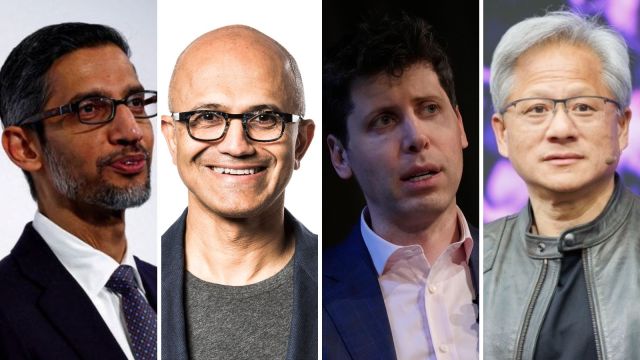Sundar Pichai, Satya Nadella, Sam Altman, Jensen Huang: 10 tech leaders named in the Time 100 AI list
The influential tech leaders who made it to the list are instrumental in expanding the conversations surrounding AI in the public domain. They are significant in shaping the future of AI, its ethical and responsible adoption.
 Tech leaders Sundar Pichai, Satya Nadella, Sam Altman, and Jensen Huang. (Express Image)
Tech leaders Sundar Pichai, Satya Nadella, Sam Altman, and Jensen Huang. (Express Image)Time Magazine has come out with its list of Time 100 AI. The second edition honouring the 100 most influential voices features some bigwigs from the tech fraternity worldwide. According to the esteemed magazine, the purpose of creating the list is to push the views of these influential leaders to their readers.
Alphabet Inc. CEO Sundar Pichai leads the list, while the list also features prominent names like Sam Altman, Satya Nadella, Mark Zuckerberg, Demis Hassabis, Dario Amodei, and Jensen Huang. All of these tech leaders, through their expertise and assortment of projects, have expanded the worldview around the rapidly developing realm of AI.
Here’s a look at the top tech leaders featured in the Time AI 2024 list:
Sundar Pichai, CEO of Alphabet Inc
Pichai as the CEO of Google is steering the company through the rapid progress in AI. Under his leadership, the company has been able to be at the top of its game in search. Despite facing stiff competition from Microsoft-backed ChatGPT, Google has maintained its dominance in search and other services like maps, email, and browsers. According to Pichai, Google’s success comes from delivering the best products and services, even if they are not the first to the market. Pichai sees immense potential in the AI wave, especially with integration of AI tools in Google Search. The CEO also acknowledges the responsibility that comes with developing and deploying AI. His leadership has been pivotal at a time when the search giant has been facing legal challenges. Even while defending the company’s practices, Pichai is spearheading innovation in AI.
Sam Altman, CEO of OpenAI
The CEO of OpenAI became the face of AI after the phenomenal success of ChatGPT. Last year, Altman’s position at the helm of OpenAI turned precarious after the AI startup briefly ousted him, citing dishonesty. Even though he returned, questions about his leadership persisted. This year, Altman announced his ambitious bid to raise $7 trillion for manufacturing AI chips. OpenAI also saw the exit of several key researchers over conflicts of interests and safety concerns. Regardless, OpenAI continued as the leader in AI, and Altman continued to steer OpenAI’s future while promoting AI’s role in shaping the world.
Satya Nadella, CEO of Microsoft
The Microsoft CEO has been consistently working towards the bigger cause: artificial general intelligence (AGI). Nadella was instrumental in Microsoft’s decision to invest its first billion into OpenAI back in 2019. Over the years, the partnership between Microsoft and OpenAI blossomed into a profit-sharing deal worth over $13 billion. Time Magazine described Nadella as someone who has proven to be a shrewd corporate maneuverer. When OpenAI fired Altman in 2023, Nadella had offered all OpenAI employees jobs at his company, essentially to neutralise the board’s threat and pave the way for Altman’s return. Since the OpenAI drama, Nadella has worked towards reducing Microsoft’s dependency on OpenAI and invested around $16 million in French AI lab Mistral.
Mark Zuckerberg, CEO of Meta
Not long ago, aspersions were cast on the Meta CEO’s influence. In the last few years, Meta faced harsh criticism and saw his ambitious ‘metaverse’ project not meeting the expectations, leading to a drastic drop in the company’s market value. Zuckerberg had been investing in AI since 2013, and when ChatGPT witnessed phenomenal popularity, he shifted Meta’s focus to AI. In the last two years, Meta’s Llama AI became one of the most powerful AI models. He even made them open source, allowing developers to build on them. While this intensified competition with Google and OpenAI, it also helped Meta gain top AI talent. Although there was criticism that it was not fully open-source, Meta’s stock got the much-needed boost. Zuckerberg’s leadership is keeping the company competitive in the rapidly changing AI landscape.
Demis Hassabis, co-founder and CEO of DeepMind
As the co-founder of DeepMind in 2010, Demis Hassabis set a 20-year aim to create AGI. In 2024, he firmly believes that the progress is on track. He believes in developing AI responsibly for maximum benefit and stresses the need for societal discussions on the responsible use of AI. Under Hassabis, Google Deepmind has accomplished numerous milestones, including progress in deep reinforcement learning, solving the protein folding problem, and introducing the LLM, Gemini. Meanwhile, Google DeepMind’s upcoming Project Astra is an AI model that is capable of processing text, audio, and video in real time.
Dario Amodei, CEO of Anthropic
Dario Amodei, as a young researcher, helped in proving the scaling laws of AI, which are fundamental to almost everything about the ongoing AI boom. As the CEO of Anthropic, Amodei spends a lot of time thinking about the duality of AI. He fears that one day humans may lose control of advanced AI as it becomes smarter. He is also concerned that AI could be used by non-state actors to make chemical, biological, or even cyber weapons. Regardless of his apprehensions, Amodei believes there is scope to build AI safely.
Andrew Feldman, CEO of Cerebras Systems
Andrew Feldman, co-founder and CEO of the AI chip startup Cerebras Systems, believes that computer chips are like cars. He explains that specific tasks require optimised designs. While GPUs that are built for graphics are being used for machine learning, Cerebras is changing that by making exclusive AI chips. In 2015, Feldman’s startup began designing its Wafer Scale Engine, a chip that is 57 times larger than a GPU aimed at AI workloads. This innovation can speed up AI model training. While Cerebras’ new platform is capable of surpassing Nvidia’s GPUs, the CEO is cognisant of the challenges while competing with a mammoth like Nvidia.
Jensen Huang, CEO of Nvidia
Nvidia CEO Jensen Huang has attained rockstar status, owing to his leather jacket look. The CEO commands celebrity-like attention, indicating its rising significance along with the soaring stocks of Nvidia, which have doubled more than 2024. The company’s stocks peaked nearly eight times their value ever since ChatGPT was launched. Nvidia initially focused on developing GPUs for video games and is today a reliable name for its AI chips. Huang led Nvidia to capitalise on the opportunity early on by designing specialised AI chips and building strong relationships with players like OpenAI.
Mustafa Suleyman, CEO of Microsoft AI
Earlier this year, Mustafa Suleyman left his startup Inflection AI to be the CEO of Microsoft AI, the company’s new unit focused on AI. Staff from Inflection AI followed him, and Microsoft signed a $650 million deal to access the company’s AI models. Suleyman is known for his ethical approach to AI, which is aimed at building emotionally intelligent chatbots. In 2018, he endorsed a ban on lethal autonomous weapons and has been a long advocate of ethical AI.
Andrej Karpathy, Founder of Eureka Labs
The Slovak-Canadian computer scientist co-founded OpenAI in 2015; he later led Tesla’s computer vision work. In 2023, he came back to OpenAI to work on improving GPT-4; however, his most significant impact would be as a leading educator in AI. He also co-designed Stanford’s first deep-learning course along with Professor Fei-Fei Li in 2015. He is known for simplifying complex topics, which he attributes to his background in physics. Karpathy has said that he is inspired by Richard Feynman’s approach to both research and teaching.
To compile the Time 100 AI 2024 list, editors and correspondents interviewed and consulted sources and members who made it to the list last year to find the best new additions. Interestingly, 91 of the members on the current list were not on last year’s list. The expansive list features 77-year-old Andrew Yao, a prominent computer scientist from China, and Francesca Mani, 15, from the US, who works for the protection of victims of deep fakes.







